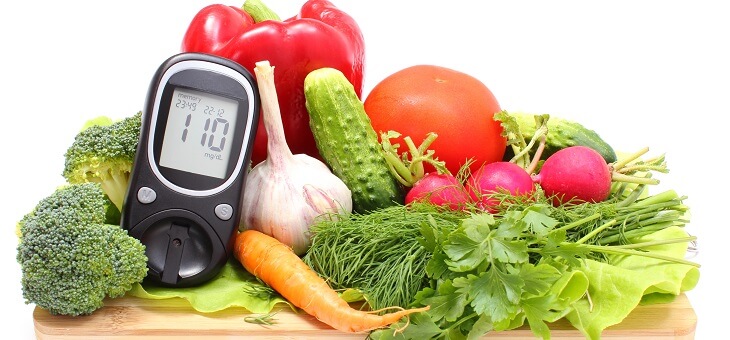Type 2 diabetes occurs when the body does not process insulin correctly, resulting in high blood sugar levels. This can lead to a range of symptoms, including tiredness, increased thirst, and needing to urinate more frequently. If left untreated, type 2 diabetes can cause serious health problems, such as heart disease, stroke, and kidney failure.
One way to manage high blood sugar is through diet. Choosing the right foods can help prevent type 2 diabetes, and it can stop the symptoms and complications of diabetes from getting worse.
Here are nine diabetes superfoods to add to your diet if you have type 2 diabetes or are at risk of developing the disease.
Salmon
Salmon contains an excellent amount of Omega-3 fatty acids (DHA and EPA). Including healthy fats in your diet can help reduce your risk of many common diabetes-related conditions. In fact, an analysis of four international studies published in JAMA Internal Medicine found that eating at least two servings of fish per week is associated with a lower risk of heart attack, stroke and death among people with heart disease.
Ensure you keep it as healthy as possible by baking, grilling, stewing or roasting the fish.
Add a salad or roasted vegetables such as broccoli or asparagus and a whole grain such as brown rice for a balanced meal.
Read: How to use these eight superfoods
Tomatoes
Tomatoes are non-starchy and have a low glycaemic index (GI). The GI is a relative ranking of carbohydrates in foods. About 140 grams of tomato has a GI of less than 15, which makes it a low GI food and an excellent food choice for diabetics. Any food that has a GI score lower than 55 is good for diabetics.
A key nutrient found in tomatoes is lycopene, which is a powerful antioxidant that boosts heart health. Tomatoes are also high in Vitamin C, which has been known to lower elevated blood sugar levels and minimise blood sugar spikes after meals in those with type 2 diabetes.
Beans
Beans are a diabetes superfood. They are high in fibre and protein, low in saturated fat and are a good source of vitamins and minerals.
Although beans do contain carbohydrates, they are low on the GI scale and do not cause significant spikes in blood sugar levels.
This is because beans are a complex carbohydrate. The body digests this form more slowly than other carbohydrates, helping to keep blood sugar levels stable for longer.
Walnuts
The combination of fibre, protein and healthy fats in walnuts makes them a great alternative to simple carbohydrate snacks such as chips or crackers.
The fatty acids in walnuts can increase good cholesterol while decreasing harmful cholesterol. This may reduce the risk of heart disease or heart attack.
According to a small 2017 study published in the journal Diabetes, Obesity, & Metabolism, walnuts may help promote feelings of fullness, preventing unhealthy food cravings and potentially aiding weight loss.
Another past study of women drew a link between eating walnuts and a lower risk of type 2 diabetes.
Walnuts are also a rich source of alpha-lipoic acid (ALA) and may help reduce inflammation in the body.
Other nuts and seeds
Walnuts aren’t the only superfood nut around.
Flaxseeds, linseeds, almonds, peanuts, pumpkin seeds, macadamia nuts, pistachios, cashew nuts, chia seeds and many more are packed full of healthy fats and fibre.
In a 2012 study, people who consumed nuts at least twice a week appeared to have a lower risk of gaining weight than those who never or rarely ate nuts.
Obesity and excess body fat are risk factors for diabetes. When a person with diabetes loses weight, their blood sugar levels may improve, too.
However, it’s important to remember that nuts are very calorie dense. Practice portion control, because consuming too much healthy fat can still lead to weight gain.
Read: Eight foods that lower bad cholesterol
Leafy greens
Leafy green vegetables are extremely important to manage diabetes. Vegetables such as spinach, kale, cabbage, lettuce, broccoli, cauliflower and collard greens are extremely nutritious and low in calories.
They are an excellent source of several vitamins and minerals such as vitamin A, vitamin C, and calcium. They are also rich in omega-3 fatty acids and help improve insulin secretion and regulate your blood sugar levels. Leafy greens are also loaded with fibre and can control hunger pangs and promote digestive health.
Citrus fruits
Oranges and other citrus fruits are naturally low-glycaemic and are rich in vitamin C to help boost the immune system. They also contain nutrients such as folate and potassium, which have been shown to support healthy blood pressure.
Eating these fruits can be a great way to get these vitamins and minerals without ingesting any carbohydrates.
Oats
Another great source of fibre, oats have been shown to boost heart health and help people living with type 2 diabetes hit target A1C levels when eaten regularly.
For the healthiest option, choose steel-cut or old-fashioned oats that don’t contain added sugars. Sweeten the meal yourself with a teaspoon of honey or fresh berries and add a splash of milk, nuts, or seeds for some added protein.
Read: Six of the most balanced foods you can find
Berries
Blueberries, blackberries, strawberries, and raspberries all contain high levels of antioxidants and fibre. They also contain important other vitamins and minerals, including:
- vitamin C
- vitamin K
- manganese
- potassium.
Add fresh berries to your porridge, eat a handful as a snack, or use frozen berries in a smoothie.
How many of these superfoods do you include in your diet? Which is your favourite? Let us know in the comments section below.
If you enjoy our content, don’t keep it to yourself. Share our free eNews with your friends and encourage them to sign up.
Disclaimer: This article contains general information about health issues and is not advice. For health advice, consult your medical practitioner.

